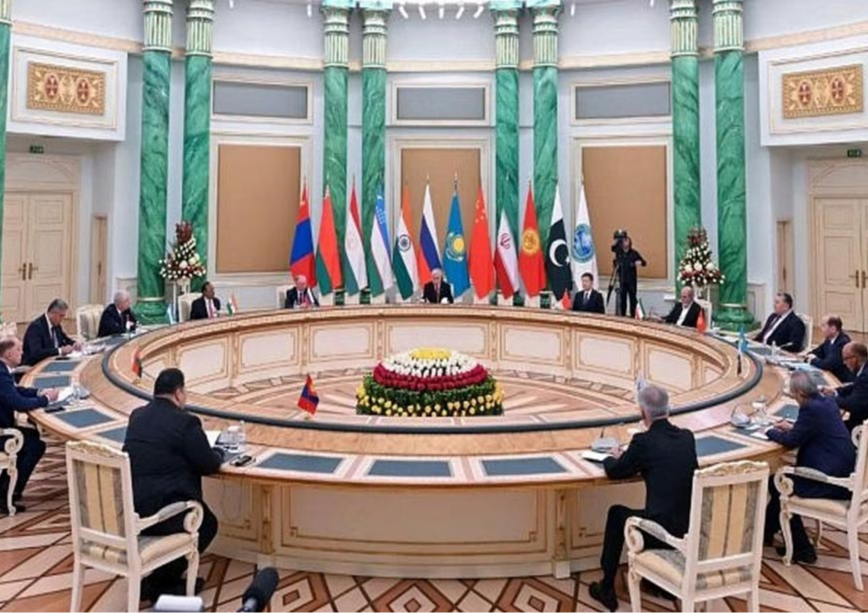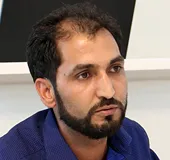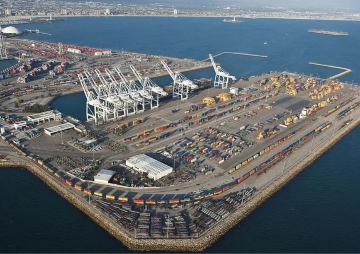India’s Defence Secretary Giridhar Aramane was in Astana, Kazakhstan, last week, leading a delegation for the annual meeting of defence ministers of the Shanghai Cooperation Organisation member states. New Delhi forcefully advocated for zero tolerance toward terrorism, emphasising the need for urgent and decisive action. It stressed upon the organisation to take a strong stand against terrorism and work toward eliminating this threat from the SCO region.
With India’s global economic stature rapidly increasing amid the ongoing geopolitical contestation in the multipolar world, it has become imperative for New Delhi to be proactive at key multilateral fora. The SCO is critical for India to advance its priorities for peace and prosperity in its northern periphery and broader Eurasia.
India and the SCO chairmanship
Last year, India’s chairmanship of the SCO was a resounding success. With over 134 diplomatic events hosted, including 14 ministerial-level meetings, India played a crucial role in bringing together this, at times, divergent grouping. However, the hegemonic pursuit and belligerence forced India to host the 23rd Summit of the Council of Heads of State of the SCO virtually.
India became a full member of the SCO in 2017. It aimed to tackle the regional geopolitical, geoeconomic, and geostrategic challenges head-on. India’s membership of the SCO was supported by Russia as a counterweight to China and to prevent this organisation from sliding under Beijing’s control.
The inclusion of Iran in the SCO has sparked concerns that the organisation may be viewed as an anti-western club, especially with the ongoing geopolitical tensions involving China, Russia, and Iran with the West.
Fast forward to 2023, China’s influence is all pervasive as Russia and the new member Iran form a de facto axis. The inclusion of Iran in the SCO has sparked concerns that the organisation may be viewed as an anti-western club, especially with the ongoing geopolitical tensions involving China, Russia, and Iran with the West. However, the presence of India, with its strong democratic credentials and a history of aversion to alliances, guarantees that the SCO is not opposed to any country or bloc. With New Delhi’s unwavering commitment to maintaining peace and security based on the UN Charter, India’s priority remains to transform the SCO platform into a development-oriented platform rather than an anti-Western one.
Imperative for proactiveness
The SCO region is facing a severe and escalating threat of terrorism from the Afghanistan-Pakistan border and certain Central Asian states. Several dreaded terrorist organisations like Islamic State Khorasan Province (ISKP), Jaish-e-Muhammad (JeM), Lashkar-e-Taiba (LeT), Islamic Movement of Uzbekistan (IMU), Tahreek-e-Taliban Pakistan (TTP), and Al-Qaeda, among others, are causing widespread destruction and fear. Unfortunately, recent terrorist attacks in Russia, Iran, and India have exposed the SCO’s inadequate ability to speak in one voice on the growing threat.
The cross-border terrorism has compelled countries to take non-military pre-emptive actions and raids against terrorists and terror infrastructure in neighbouring countries. India has had to do this twice, and more recently, Iran launched an attack on Pakistan, targeting terror groups within its territory. Such actions are increasingly now deemed necessary to ensure citizens’ safety and security and prevent the spread of terrorism. In the process, they make the SCO region even more fragile and susceptible to conflicts and wars.
Since 2017, New Delhi has sought cooperation from the SCO member states to fight cross-border terrorism as the organisation has prioritised the fight against separatism, extremism and terrorism since 1998, codified under Article 1 of the SCO charter.
At the SCO summit in 2001, the Afghanistan-Pakistan region was referred to as the “cradle of terrorism” and member states supported building a strong counterterrorism grid in the form of a Regional Anti-Terror Structure (RATS). New Delhi has successfully gained support for the draft of the UN Comprehensive Convention on International Terrorism (CCIT) from member countries of the SCO through its diplomatic efforts. However, the RATS, following the SCO mandate, only uses Russian and Mandarin to maintain the terrorism and terror-related database. To enhance communication on counterterrorism in the larger Eurasia region, New Delhi is advocating using English as one of the primary languages in the SCO.
New Delhi has successfully gained support for the draft of the UN Comprehensive Convention on International Terrorism (CCIT) from member countries of the SCO through its diplomatic efforts.
India has been trying to leverage this regional grouping to advance its geostrategic and geoeconomic interests in Eurasia, based on cultural, civilisational, and spiritual connections. To this end, New Delhi has extended a $1 billion credit to Central Asian nations for infrastructural development, including $20 million for the Dushanbe-Chortut highway in Tajikistan. With India’s growing global stature in both economic and geopolitical spheres, Central Asian states are increasingly turning to New Delhi to counterbalance Chinese influence in the region. During the inaugural India-Central Asia summit in 2022, the leaders emphasised the imperative to incorporate Iran’s Chabahar Port and Turkmenistan’s Turkmenbashi Port in the International North-South Transport Corridor (INSTC) to facilitate direct trade. India and Central Asia have also formed a Joint Working Group on Chabahar Port to boost trade and connectivity between South Asia and Eurasia.
Unlike China’s belligerent and hegemonistic approach toward its neighbours, New Delhi has stressed transparency as well as sovereignty and territorial integrity in connectivity projects. It has reminded the SCO member countries of the ‘Shanghai spirit’ of the organisation. Even though India has faced continued opposition from the Pakistan-China axis in the SCO platform on connectivity, counterterrorism and sovereignty issues exemplified by the China-Pakistan Economic Corridor (CPEC), New Delhi has leveraged the forum to expose the Pakistan-sponsored terrorism in Afghanistan and Kashmir and also highlighted the concept of growth and security for all in the region. New Delhi will have to continue to be more proactive in the forum to shape the future agenda of the SCO on the lines of prosperity, terror-free Eurasia, and connectivity based on the sovereignty and territorial integrity of member countries.
This commentary originally appeared in The Print.
The views expressed above belong to the author(s). ORF research and analyses now available on Telegram! Click here to access our curated content — blogs, longforms and interviews.




 PREV
PREV



